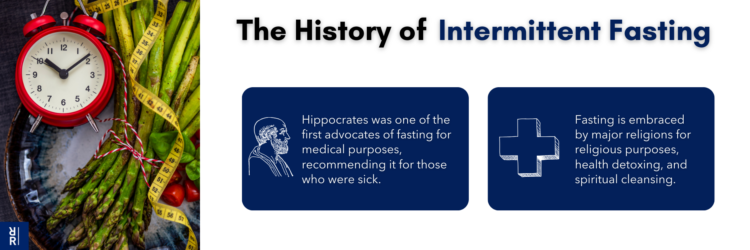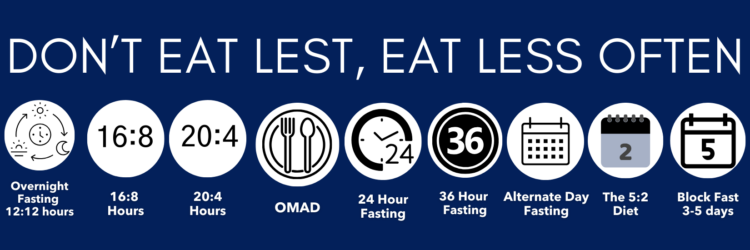
“To eat when you are sick, is to feed your illness”- Hippocrates
Fasting Through the Sands of Time
At The Remedy Room, we’re dedicated to exploring holistic health practices that can transform your life. Today, we’re taking a deep dive into a practice that has transcended time and culture, which Hippocrates, the father of modern medicine, extolled for its extraordinary healing potential – fasting. Fasting isn’t a new fad; it’s an age-old practice that has been revered throughout history for its profound impact on health. Picture this – Hippocrates, who lived over two millennia ago, recognized fasting not just as a remedy but as a potent tool for those facing health challenges. This rich history underscores the timelessness and significance of fasting in our journey to wellness.
Evolving Eating Patterns
As we fast-forward to today, our eating habits have undergone a seismic shift. It’s staggering to think that the average person now consumes food or beverages approximately 17 times a day! This stark contrast to a time just as recent as the 1970s, who adhered to a simpler three-meals-a-day regimen of breakfast, lunch, and dinner, raises intriguing questions about the implications of this shift on our health. Manufacturers and marketers have played a significant role by adding addictive ingredients and chemicals to many products, designed to increase appetites and promote excessive consumption. This manipulation of our food environment underscores the importance of informed and mindful eating in today’s world.
The Power of Ketosis
As you delve deeper into metabolic flexibility, you’ll encounter the magical realm of ketosis. In a ketogenic state, your body shifts from primarily using glucose for energy to burning fat for fuel, producing ketones in the process. Achieving ketosis, often indicated by a reading of 0.5-1.5 mmol/L on your Keto-Mojo meter, has a profound impact on your health. This has nothing to do with, diabetic ketoacidosis, which is often what your doctors will tell you when ask you to stay away from a ketogenic diet, but these ketones are what your body can make naturally.
Metabolic Flexibility and Ketosis
What’s metabolic flexibility? It’s all about fine-tuning your dietary choices to encourage your body to burn fat for fuel efficiently. This involves consuming fewer than 50 grams of carbohydrates per day and deriving at least 50% of your diet from healthy fats. It’s complemented by intermittent fasting, typically consisting of a 15-16 hour fasting window each day, and following a 5-1-1 formula. Five days intermittent fast for 16/8, 1 feast day, and 1 fast day.
Keto-Mojo and Optimal Goals
For those who thrive on data-driven health management, Keto-Mojo emerges as an invaluable companion. This tool allows you to monitor glucose and ketone levels, not only facilitating enhanced mental clarity and memory but also actively participating in the repair of damaged neurons and potentially reducing the risk of neurodegenerative diseases. Other tools include wearing CGMs like Nutrisense. To maximize the benefits of ketosis, aim for glucose levels between 70-90 mg/dL and ketone readings above 0.5 mmol/L, with the ideal nutritional ketosis range falling between 0.5-3.0 mmol/L. Consistency is key, and your morning ketone levels, blood sugar, and ketone readings before your first meal can offer valuable insights into your metabolic health.
Beyond Calories: The Science of Weight Loss While Fasting
Fasting is far more intricate than mere calorie counting. Intermittent fasting notably promotes fat burning by encouraging the use of stored fat for energy during fasting periods. What’s equally significant is how intermittent fasting regulates hormones crucial for hunger control. It lowers ghrelin, the “hunger hormone,” reducing those intense food cravings, while simultaneously boosting leptin, the “satiety hormone,” signaling to your brain that you’re full and satisfied. This hormone balance makes it easier to manage calorie intake and resist the temptation to overeat.
Intermittent fasting also plays a role in stabilizing insulin levels, which helps maintain steady blood sugar levels and prevents energy crashes and subsequent cravings for sugary and high-calorie foods. Additionally, it has positive effects on cholesterol levels and aids in clearing excess triglycerides from the liver. These combined benefits make intermittent fasting a flexible and effective strategy for achieving weight loss goals while supporting overall health. These intricate physiological responses offer a profound impact on our health, far exceeding the simplicity of calorie arithmetic.
If weight loss coaching piques your interest, kindly complete the form provided below. We offer a range of plans tailored to your preferences, including free self-guided options and guided coaching.
Unlocking a Multitude of Health Benefits
Intermittent fasting isn’t just about shedding excess weight; it represents a holistic approach to enhancing overall health. Rigorous scientific research suggests that intermittent fasting can significantly reduce inflammation, elevate metabolic health, assist in the management of diabetes mellitus, promote cardiovascular well-being, and even hold the potential to thwart specific types of cancer. Perhaps most intriguingly, these benefits are attainable even when substantial weight loss is not the primary objective.
Fasting represents a transformative practice that transcends the narrow confines of weight management. It offers a multifaceted approach to health improvement, encompassing a reduction in the preservation of muscle mass, support for weight loss goals, enhancement of brain and heart function, and even the tantalizing possibility of extending our lifespan.
The Psychological Aspect
In our fast-paced, food-centric society, it’s not just physiological hunger that drives our eating habits. We’ve become conditioned by societal norms and psychological triggers that often lead to overconsumption. Fasting offers an opportunity to reconnect with our body’s true cues for nourishment, differentiating between genuine physiological hunger and learned behavioral patterns.
The Art of Autophagy
One of the remarkable processes triggered by fasting is autophagy. Pronounced “ah-TAH-fah-gee,” it’s the body’s innate mechanism for recycling old and damaged cell components while eliminating unnecessary or dysfunctional elements. Think of it as your body’s built-in recycling program, purging what no longer serves you.
Mental and Cognitive Benefits
The advantages of metabolic flexibility and ketosis extend far beyond the physical realm. Improved mental clarity, memory enhancement, and heightened cognitive function are just a few of the mental benefits reported by individuals who have embraced this lifestyle.
Reducing Inflammation and Disease Prevention
Metabolic flexibility and ketosis have demonstrated remarkable potential in reducing inflammation, a key driver of many chronic diseases. By mitigating inflammation, this approach can reduce the risk of various health conditions and enhance overall well-being.
Cardiovascular Benefits
Fasting offers a range of cardiovascular benefits, including the reduction of cholesterol levels and the removal of excess triglycerides from the liver, which collectively support heart health. Additionally, it contributes to lowering insulin levels, reducing atherosclerotic plaques, decreasing blood pressure, resting heart rate, hunger, and leptin levels, resulting in reduced body fat and toxins, as well as diminished inflammation
Fasting’s Impact on the Battle Against Cancer
Fasting’s role in the context of cancer patients is nothing short of astonishing. The intersection of fasting and cancer is a realm of profound significance. Fasting can significantly reduce glucose and IGF-I levels, potentially improving treatment outcomes for cancer patients. Its ability to substantially lower glucose and IGF-I levels contributes to enhanced treatment results by depriving cancer of its preferred fuel source, sugar. Moreover, it can protect healthy cells, sensitize cancer cells to chemotherapy, promote apoptosis (cell death) of precancerous and cancerous cells, and trigger the cellular self-cleaning process of autophagy.
Exclusions and Exceptions
While fasting holds immense promise, it’s important to note that it’s not a one-size-fits-all solution. Specific individuals, including pregnant and breastfeeding women, those striving to conceive, children, individuals struggling with eating disorders, and those who are underweight or malnourished, should not fast. Nevertheless, it’s crucial to emphasize that, under the guidance of a medical professional, individuals with certain medical conditions like diabetes or PCOS can harness the benefits of fasting safely.
Fasting Recap
In summary, fasting emerges as a comprehensive, multifaceted approach to health and wellness. Its benefits extend beyond weight management, encompassing reductions in inflammation, preservation of muscle mass, support for weight loss goals, enhancement of brain and heart function, and potential extensions of lifespan. As we conclude this profound exploration of fasting, we hope you’ve gained a comprehensive understanding of its incredible potential.
At Remedy Room New Orleans, we’re passionate about guiding you on your journey to wellness. Our team of dedicated professionals is here to provide personalized guidance, answer your questions, and support your pursuit of optimal health. Don’t hesitate to reach out and discover how fasting can be integrated into your unique wellness journey. If you are interested in our weight loss coaching please fill out the form below. We have a plan that fits you from free do-it-yourself options to guided coaching. Embrace the healing power of fasting, and embark on a transformative path towards a healthier, more vibrant you.
General Weight Loss Inquiry (new)










